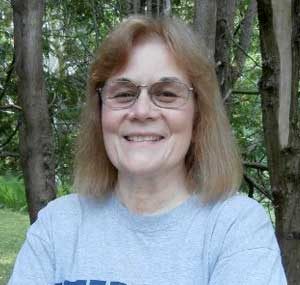
Cheryl, from Frankfort, MI, received two corneal grafts to treat Fuchs’ dystrophy. Without generous cornea donors, she wouldn’t have been able to keep working and enjoying her active lifestyle.
Cheryl is an active 64-year-old from Frankfort, Michigan who grew up on a farm, has been married for 44 years, and has one daughter and three grandchildren. She’s proud of her degree from University of Michigan, and since 1970 she has worked off and on for the Social Security Administration where she helps blind, disabled, and older people file their claims. For 30 years, though, Cheryl has experienced a slow decline in her vision. Eventually, her eyesight reached the point where it could only be corrected to 20/70 with glasses—worse than the legal limit to drive. “I was facing blindness, and most of the things I like to do – read, drive, be outdoors, photography, editing photos – require sight,” she said. Had it not been for corneal transplantation, Cheryl’s vision loss would have prevented her from working and enjoying her active lifestyle.
Cheryl’s mother suffered vision loss due to Fuchs’ dystrophy, a hereditary disease that causes the corneas to cloud over and blister. Unfortunately, Cheryl inherited this disease, too. “In the last two to three years I really noticed my vision loss,” she said. “When you lose something so subtly over a long period of time, you don’t realize what’s going on.” More recently, Cheryl would wake up in the morning with fluid covering her corneas. “When I looked in the mirror, it was clouded over like having the shower on,” she said. “It would clear in an hour or two, but I had to use a hair dryer and drops to get the fluid out. Nothing was sharp, though, and lots of light was irritating.”
In addition to the pain, Fuchs’ dystrophy jeopardized Cheryl’s ability to commute to her job. “I work in Traverse City, about 40 miles one way,” she said. Cheryl would take side roads to avoid higher traffic routes. And when she arrived at work, her vision problems interfered with her job. “I work on a computer screen, and that was getting difficult,” she said.
Last year, after spraining her ankle, Cheryl had a poor response to pain medication that caused the Fuchs’ dystrophy to flare up, significantly reducing her vision in one eye. That was when her ophthalmologist, Dr. Arkin of Traverse City, finally advised a transplant. “We scheduled the surgery for eight weeks later,” Cheryl recalled. Dr. Arkin performed an endothelial keratoplasty, which means only the damaged part of the cornea was replaced and her post-surgery recovery was shorter. “Thankfully Saving Sight had the cornea, and I was there with the need. I got the surgery on Friday, and by Sunday I was seeing better. Two weeks later, I was seeing 20/25 in that eye. It was just really amazing.”
Saving Sight offers recipients and donor families the opportunity to correspond, so Cheryl shared her experience with her donor’s family. “I wanted to let the donor family know how thankful I was,” she said. “That was a moving experience to write a letter to the family articulating what it meant to me and that I know what it meant to them. I am so thankful that people are willing to donate.”
Through blindness, Cheryl also learned more about the people she helps at work. “It gives me insight more so than ever,” she said. “It makes me a better person, knowing what someone goes through when they lose their ability to function.”
Six months later, Cheryl received a transplant on her other eye to replace that cornea, too. “Dr. Arkin did an incredible job with my eyes,” she said. “That transplant healed even more quickly because the eye wasn’t as bad. I feel I was very lucky when everything progressed. All in all, it’s been a positive experience.”
As part of her active lifestyle, Cheryl is planning two hiking trips on South Manitou Island, an island in the northern part of Lake Michigan. “I’m going to take a ferry out to the island and backpack for a couple of days, hauling all my stuff by myself,” she said. “Before surgery, that wouldn’t have been doable because I wouldn’t have felt my sight was good enough to go on my own. Now I can do that, so the transplant has really given me my life back.”
To join the millions of Americans like Cheryl who signed up for the donor registry, register online at Donate Life America or at your local Department of Motor Vehicles office. And be sure to share your decision with your family and friends.

